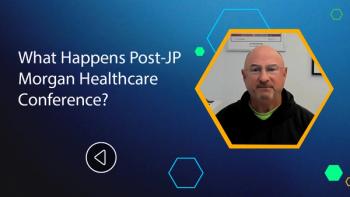
Healthcare Serving as a Roadmap for Other Sectors
Ted Sweetser, VP, Ad Partnerships and Strategy, PurpleLab explains how the healthcare industry's experience with privacy-compliant targeting can serve as a roadmap for other sectors.
In his video interview with Pharmaceutical Executive, Ted Sweetser, VP, Ad Partnerships and Strategy, PurpleLab explored the challenges and opportunities in healthcare advertising, particularly in the context of increasing data privacy regulations and the decline of third-party cookies. The discussion highlighted the importance of leveraging real-world data (RWD) to gain valuable insights into patient behavior and preferences. RWD, when combined with advanced analytics and privacy-compliant targeting techniques, enables more effective and targeted advertising campaigns. The conversation also touched on the potential impact of cookie deprecation on the broader advertising industry and the need for advertisers to adapt to a more privacy-centric approach.
How can the healthcare industry's experience with privacy-compliant targeting serve as a roadmap for other sectors, such as retail and finance?
I think finance has learned a lot of similar lessons because of a lot of the regulatory compliance they go through as well. But, you know, I think a lot of what we've been dealing with as an industry has been due to the, you know, the technical debt that came out of the early stages of the ad tech universe. So, you know, tech is currently experiencing a backlash in Congress and at a regulatory level, which was driven by a lot of aggressive data collection tactics that were employed by walled gardens your social media or Google, just for instance, where their approach was, we're going to collect as much data as possible all the time, continuously. I mean, you hear about it, you know, it hit automakers most recently, where someone was relicensing all of the information about vehicle activity, and it was being applied in the insurance industry to adjust people's rates when you have an aggressive data collection methodology that says, I want to pick up everything and anything, and I'll figure out what to do with it later. You're going to end up with, you know. Potential issues of some kind.
I referenced privacy by design earlier. One of the principles of this philosophy, which we have to apply constantly in the healthcare space is the principle of data minimization, so understanding, when you're considering a project exactly what information is needed to make that project succeed, and not willfully collecting all of the other information that you could potentially collect. An example I'd give of that is, you know, like when people do footfall traffic analysis in urban areas, there's two approaches that you could do if your job is to figure out how many people walk through this square every day. Option one is you could set up a camera, you know, like a 4k thing that records everything, and you could just train that for a week or so on a square and record it. The other is you could set up a much simpler data capture tool, like a laser or something that just captures the number of different people who walk by. One of those is going to give you a massive data set that includes faces and all sorts of other things.
The other one is just going to give your account of how many people walk through, if you're invested in just trying to accomplish, you know, the goals that you set out to and not to, you know, harvest as much data as possible. You know, you're going to answer your project, your product question, and you're not going to end up with a lot of information that can potentially be a liability to you. So, when we talk about, you know, retail or finance, you know, I think retail media networks are a really interesting, massively growing space where they have an opportunity to learn from these same practices of exactly what data is necessary to create effective media ecosystems where people can efficiently deliver advertising, and what maybe goes over the line to the way that earlier versions of this ad tech ecosystem were created, which we're just saying. We're going to grab everything. We'll figure out what to do with it later. And you know, healthcare has always known that we need to have the more responsible of those two approaches.
Newsletter
Lead with insight with the Pharmaceutical Executive newsletter, featuring strategic analysis, leadership trends, and market intelligence for biopharma decision-makers.




